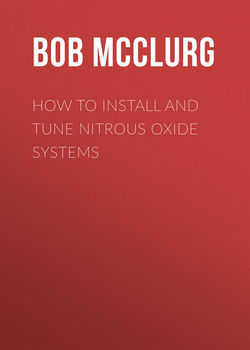Читать книгу How to Install and Tune Nitrous Oxide Systems - Bob McClurg - Страница 18
На сайте Литреса книга снята с продажи.
Project: NOS Solenoid Rebuild
ОглавлениеSome nitrous oxide solenoids are rebuildable and some are not. Generally, the higher the quality of the solenoid, the greater the likelihood that it’s rebuildable. The top-of-the-line solenoids manufactured by Nitrous Oxide Systems (NOS), Nitrous Express (NX), Nitrous Supply (NS), Wilson Manifolds & Nitrous Pro-Flow, ZEX, etc., are all rebuildable and rebuild kits are available.
If you are an active nitrous oxide racer, chances are pretty good that servicing your solenoids as part of overall trackside maintenance is normal. But for those who only occasionally use their N2O systems, it is highly recommended that you check these solenoids at least once each year to avoid leaks or complete failure. Problem areas to look for include the following:
• The internal seal, which is an O-ring that surrounds the plunger and rides up and down on the stem of your solenoid, can deteriorate from wear and debris. These seals are usually designed to withstand up to 1,100 psi. However, they can get cut or pinched due to over pressurization. If it is a rubber seal, it can swell up. If it’s a Teflon seal it can be beaten down into the seat at the base from excessive pressure and constant use.
• Nitrous plungers are also susceptible to the physical laws of nature, such as fluctuations in manifold pressure, fuel vapors, etc., and can swell up and in some cases disintegrate. This reduces the nitrous flow to your engine, causing excessively rich nitrous/fuel conditions and loss of power.
• Keeping in mind that lift on most N2O solenoids is .050 to .060 inch max, excessive buildup of N2O deposits from fuel vapors, lack of use, and poor filtration can seriously affect nitrous flow through the orifice. It’s almost like having an impassible stalactite hanging down from the roof of a cave.
• Generally speaking, coils are trouble free unless they are left on too long. That’s especially the case with the higher-pressure nitrous side. Most N2O solenoid coils pull around 8.5 to 10 amps. Some heavier-duty/higher-capacity N2O race coils may pull as much as 15 amps but, generally speaking, 8.5 to 10 amps is average for a single-stage Street/Strip nitrous kit.
• If a nitrous coil is left on (open) for 30 to 60 seconds, the heat buildup needs to be radiated away. A recommended cool-down period is generally 30 minutes between duty cycles, or the coil could ultimately fail.
• Another byproduct of an overheated nitrous coil is the creation of an open circuit. Quite typically, the average N2O coil draws 1.2 to 1.4 ohms during duty cycle. If the coil is stuck in the open position, it either produces an excessive reading of more than 20 ohms or reads as a dead short.
• Fortunately, fuel solenoids are almost indestructible. Due to the chemical composition and temperature of gasoline, their resistance is much higher; up to 20 ohms. However, fuel plungers and seals are also susceptible to excessive pressure, contaminants, lack of use, and material buildup in the orifice from fuel percolation, dirt, or gummy fuel additives, etc., so it’s sheer folly to not simultaneously rebuild the nitrous and fuel solenoids.
These exploded views of both an NOS PN 16000-16040 N2O solenoid (left), and PNs -16020, -16050, and -16080 fuel solenoids (right) clearly illustrate the component makeup of each one. These are commonly used on almost all popular Holley/NOS street/strip N2O kits, although the actual design is fairly universal. (Illustration Courtesy Holley/NOS).
Nitrous solenoid rebuild kits cost about $35 to $40 at participating nitrous retailers. Ideally, these kits feature a new spanner nut for each solenoid, new nitrous and fuel solenoid plungers, plunger springs, new O-ring seals, and highly detailed instructions. Actual rebuild time is largely dependent on the mechanical skills of the builder. About two hours per solenoid is average, and no special tools are required. Or you can pay a competent shop such as Nitrous Supply to perform the rebuild for you. Depending on type and size of nitrous and fuel solenoid, a service fee of about $40 to $60 is average. The following steps show 30-year N2O veteran Mike Flynn of Nitrous Supply as he rebuilds a set of NOS N2O Pro Shot (PN 16040), and Fuel Cheater solenoids (PN 16050), using an NOS Nitrous Solenoid Rebuild Kit (PN A-5141-S).
